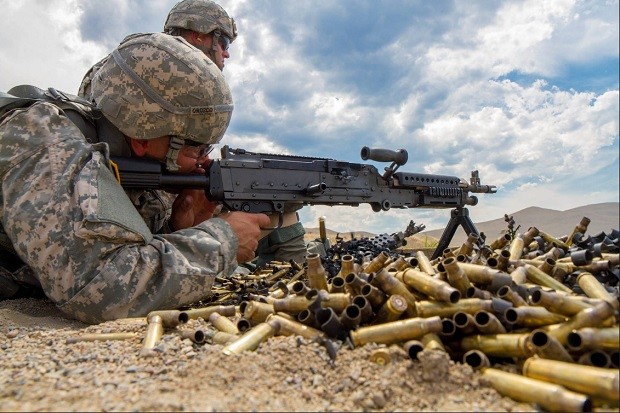Prison-made US combat helmets endangered soldiers — report

A US Army soldier fires an M-240 machine gun during the U.S. Army Reserve’s #BestWarrior competition at Fort Harrison, Montana on Aug. 8, 2016. The military recalled 150,000 combat helmets made by prisoners after these were found defective. US ARMY PHOTO BY CALVIN REIMOLD
WASHINGTON, United States — Defective combat helmets produced for the US military using prison labor in Texas put soldiers’ lives at risk, according to a report released Wednesday by a Justice Department watchdog agency.
Poorly supervised inmates also used dangerous, improvised tools, including makeshift hatchets, which could easily have become prison weapons, according to the Justice Department’s Inspector General.
Nearly 150,000 of the helmets were manufactured between 2006 and 2009, a period during which the White House ordered “surges” in combat troop levels in Iraq and Afghanistan.
However, investigators did not uncover any evidence that soldiers or marines had died as a result of defects in the helmets, which failed ballistics tests and were made with substandard materials.
READ: France-based helmet maker eyes hub in PH amid infra boom
All the helmets were recalled or quarantined by military officials. Total costs to the government amounted to $19 million.
ArmorSource, an Ohio defense contractor tasked with making the bulk of the helmets, agreed with the Justice Department in March to pay $3 million for producing the defective equipment under the False Claims Act.
Paul Garcia, chief contracting officer at ArmorSource, told AFP that his company had no comment. ArmorSource continues to supply equipment to the Defense Department.
ArmorSource subcontracted much of the helmet manufacture to Unicor, a wholly-owned government corporation operated within the US Bureau of Prisons to employ federal inmates.
According to the report, Unicor directed inmates to falsify manufacturing records to indicate helmets had passed inspection. In at least one instance, a Defense Department inspector certified entire lots of helmets over a fax machine, according to the report.
Workers pried open finished helmet shells to stuff the ear sections with scrap Kevlar and Kevlar dust. They also switched or doctored serial numbers, the report said.
An unannounced visit by inspectors in 2010 at a federal prison in Beaumont, Texas found inmate employees using dangerous improvised tools, “degrading prison security,” the report said.
The Bureau of Prisons told AFP that Unicor had improved quality management and reacted “immediately” upon learning of the manufacturing concerns.
RELATED STORY
Man driving motorcycle sans helmet dies in Maharlika Highway mishap